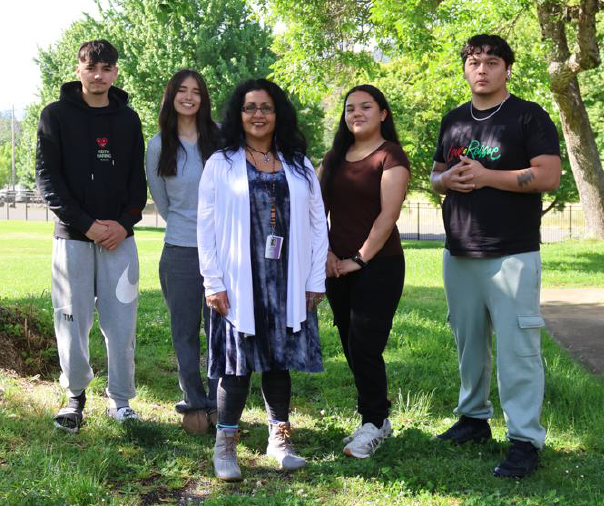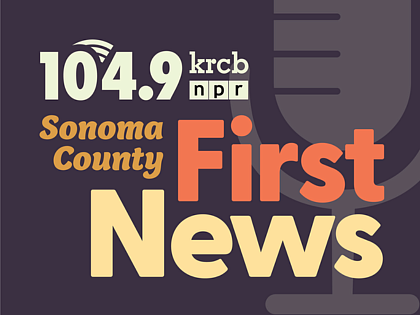 photo credit: Ukiah Unified School District
photo credit: Ukiah Unified School DistrictLeft to right: Tyeson Ramos, Nora Frease, Teacher Buffie Schmidt, Lily Elliott, Sonny Elliott
In Mendocino County, a small group of students recently completed four years of study in Northern Pomo language and culture. It's considered a major milestone for a long dormant Indigenous language.
“Kaji k'edi na – It’s a good day. Congratulations all graduates and incoming freshman, and I hope that you decide to take a healthy risk and take my class. We talk to a lot of these graduates, a lot of my students, they’ll say I’m a really good teacher.”
That’s Buffie Schmidt, the course’s founding teacher, speaking at the May 21st Native American graduation ceremony at Ukiah High School. She says being bilingual gives students a great advantage in life, but there’s deeper significance for native students learning their indigenous languages.
“It heals. It heals themself, it heals their family, and it heals the next generation,” said Schmidt. “We have suffered as native people so many hardships and atrocities, and even though it happened before many of us were born, we still feel that intergenerational trauma.”
Angela James is vice chairperson for the Pinoleville Pomo Nation. She is also vice chair of the Ukiah Unified School District Title VI Native American Parent Committee. That committee collaborated with community members and the State of California to establish the Northern Pomo language and culture courses at the high school.
James says she grew up hearing her grandparents speak native languages, but they were not passed on.
“My grandfather, Smith Williams, never taught my mother the Northern Pomo language, because in his time, it was forbidden to speak our language. And if a native person was caught speaking their language, they were beaten. Some of these beatings resulted in the death of our native people. And so to protect my mom, my grandfather never taught her the language,” said James.
Northern Pomo has been a dormant language for multiple generations. Schmidt says it’s a benefit for the community to hear the language spoken again.
“And the more we speak it, the less awkward it becomes,” Schmidt said. “It’s a native language in this area, and I notice that a lot of people are shy or back away from speaking, because it is awkward because it’s different. And different doesn’t mean bad. It just is something new.”
The classes also include cultural lessons once a month.
“Basket weaving, clapper stick making, hand games, regalia making. We learned about MMIP, Missing Murdered Indigenous Peoples, and we learned how to use wild foods in our everyday diet,” said Schmidt.
This year, four students completed four years of studying Northern Pomo and these cultural lessons – two of the students, Nora Frease and Sonny Elliott, were awarded the California State Seal of Biliteracy in Northern Pomo, the first such recognition in history.
“It makes me feel good, just because I know that I’m, like, the first – one of the first, and the first female,” said Frease.
Frease says when she first started taking the courses in 2021, there were less than 45 students in the class. The number slowly dropped over the years to the final four seniors. But she says interest in the course is growing.
“As like more students are coming in, and there’s more, like, outreach about the class, I feel like a lot more students are more open to actually joining that class,” Frease said. “When my class got here, the freshman year, that was the first year they ever incorporated that class into the district. So, it’s kind of – it’s like we’re the guinea pigs. But it turned out really, like it came out really well.”
Frease says her younger siblings are taking the course work and following in her footsteps, and that her mother is very supportive.
“She thinks it’s cool, ‘cause she’s never seen anything like this when she was growing up,” said Frease. “And she wasn’t really in touch with her culture like that growing up. And she says it’s like – she’s almost jealous to see that we’re able to do things like this when she wasn’t able to.”
Besides sharing Northern Pomo language with her family, Frease says she has also been teaching words to her dog, a German Shepherd mix named Bronx.
“There’s like ‘sit’ is ‘jima.’ There’s ‘t̪ʰana’ for ‘hand,’ and then we’re slowly gonna start incorporating more words that he can, like, understand quickly, and that are pretty, like, short for him,” said Frease.
Another student who completed four years in the program is Tyeson Ramos, keeping his language skills by sharing it with others.
“Right now, I’m working for Coyote Valley Reservation’s health department, and they asked me to do a Word of the Week for the youth,” said Ramos.
Ramos says he understands the significance and feels a responsibility of reviving this language.
“It’s just like a milestone in the Pomo community, because they’ve been trying to keep this language alive for years, and me being part of it seems like, it’s just really important to me and my family,” Ramos said.
Dan Dougherty is with the Ukiah Unified School District. He says the graduation ceremony held special significance.
“As the speakers spoke, and as the students spoke, it kind of set in – the gravity of what was happening here, because this language was once forbidden,” said Dougherty. “And the local tribes have been trying to revitalize this language since the 70s, so it really was a great accomplishment. As they speak the language today, they’re honoring their ancestors.”
Schmidt says teaching these classes has been a challenge. There are no textbooks, no written language, and no established curriculum for her students. But Schmidt says she thinks there are universal truths to discover within Northern Pomo, as she described in her speech to students and parents at the recent ceremony.
“One of the many words that we have been asked about over the years is the word for ‘love.’ What is the Northern Pomo word for love?” said Schmidt. “In our culture there’s not a single word that translates to ‘love.’ There are only actions. Love is not a noun, but a verb."

 Live Radio
Live Radio




